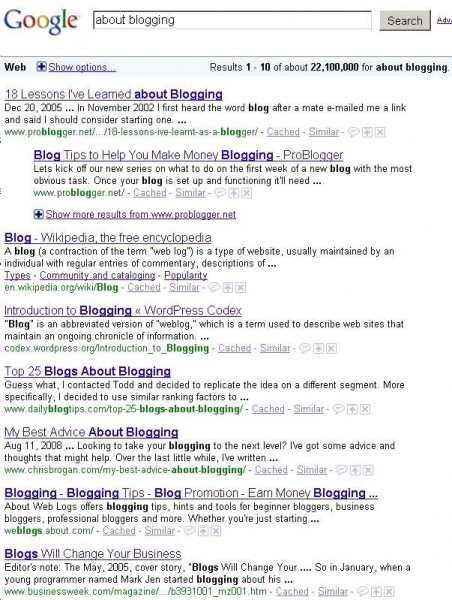A blog post about…blogging!
 I’m primarily a programmer, but I have enough background in business, marketing, communication, and development / sales, that I get a lot of questions from clients and prospective clients about website content and blogging. Since we started discussing online marketing for businesses and non-profits in my Goin’ Fishin’ post, this will just continue on with those ideas a bit.
I’m primarily a programmer, but I have enough background in business, marketing, communication, and development / sales, that I get a lot of questions from clients and prospective clients about website content and blogging. Since we started discussing online marketing for businesses and non-profits in my Goin’ Fishin’ post, this will just continue on with those ideas a bit.
As you can see to the right, there’s no shortage of advice available “about blogging.” 22,100,000 hits on Google suggests that everyone online has an opinion or two on the subject. I’ll try to keep my thoughts short and simple and will suggest you take some time to see what some of those others have to say as well.
Be Yourself
If you try to be someone else it’ll eventually, if not immediately, be obvious to your readers and it won’t help you.
That said, be the “best” version of yourself you can be. Be positive and more people will pay attention to you. If you need an outlet to express anything negative, find one outside of your business. If you have bad news to share, or a sad story that is relevant, then do it. Just find something useful or positive about it to include.
A Simple Test
Though we’re focused on what to blog about, it’s wise to have boundaries as to what not to blog. In keeping with my intent to keep this simple, here’s one rule regarding communication on the ‘net: if you wouldn’t be comfortable saying it openly and publicly to your clients, friends, family, and anyone else that you know, then you shouldn’t say it on the ‘net.
Provide Value
- News is good! Imagine a current or past client either coming into your business or running into you elsewhere: what would you talk about? You’d want to know their news and you’d share your own. Anything you’d share with them regarding your business belongs in a blog post. Your posts can and should be timely – news doesn’t occur on a schedule, why should your newsletter? Over time your blog will become the history of your business. As I said above, don’t be afraid of the bad news either.
- Useful information is good! If you have some expertise or a valuable opinion, your blog is the place for it. Not only will you build a knowledge base over time, one that can be found by those searching the web, but you will have the chance to organize and streamline the information that is important to your clients. This will come in handy when communicating with others that don’t read your blog. Do not be afraid to link to relevant content away from your site, just open outside links in their own tab or window.
- Recognition of others is good! Public acclaim for clients, vendors, people in your community, or anyone who deserves notice, so long as its relevant to your enterprise, is great fodder for a blog post. Client accolades, staff achievements, reviews of books or educational programs are just a few possibilities.
- If you wouldn’t rush straight into a sales pitch with someone stopping by or someone you just met, then think twice before you do it in your blog. Ditch the Pitch is the best advice I can give, and unfortunately the bit of advice that seems to be most often ignored, typically to disastrous effect.
Aim Small
You cannot be all things to all people in your business, nor can you with your blog. Stick to news and useful information, focused on you and your business, particularly on those things where you have a unique or significant level of expertise.
Also aim small in your posts. If you can keep them short, interesting, and valuable, you are doing great things. Post enough to be timely and interesting, but no so much that readers abandon your blog because they cannot keep up.
Use the Right Tool
It’s been said that for the person whose only tool is a hammer, every problem looks like a nail. On the web, and in your blog, the primary tools are text, links, and images, as well as video and audio if you choose to learn just a little bit about their production. A simple graph or chart, or even just a picture, is often all you need to communicate a point. In some cases no amount of verbiage can communicate what a video clip might be capable of doing in just a few seconds.
Finding or creating appropriate content other than text is hard work, there is no doubt about it. The return on that investment of time can be substantial though, in many cases making the difference between a post that draws little interest or attention and one which attracts a large amount of traffic and interaction.
Invite Interaction
Solicit opinions, ask questions, encourage the communication to go in all directions. The real power of the ‘net is that everyone can communicate. For example, and as a conclusion, I welcome your comments below.

 RSS Feed - Comments
RSS Feed - Comments Phone / Email
Phone / Email RSS Feed - Blog
RSS Feed - Blog Facebook
Facebook LinkedIn
LinkedIn
[…] read this great post about blogging that really helped me! Also an oldie but GoodieL 15 Reasons You Should Be Blogging. […]